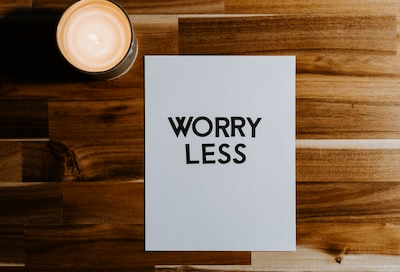Exploring Strategies for Inner Peace
Ever pondered over this: Can we learn to manage our fears? Or unlearn the habits that lead to sleepless nights?
In a world that never seems to slow down and where the demands of daily life can often feel like an unending marathon, the concept of conquering worry, anxiety, and fear, finding that elusive inner peace, and achieving better sleep might initially seem like a distant dream.
However, as we look into comprehending the link between our body and mind and its impact on our sleep cycle, it starts to appear more achievable. Similar to a musician tirelessly practicing scales until their melodies flow effortlessly or an athlete diligently training to reach peak performance, we too can train ourselves to nurture our mental and physical well-being, ultimately leading to sound sleep.
In this blog post, we will explore the profound relationship between fear, anxiety, and sleep, shedding light on their impact and offering effective strategies to help you break free from the daily habits of worry and anxiety aiding the way for a more peaceful and restful sleep.
Table of Contents
The Concept of Fear: The Link Between Anxiety and Sleep
Did you know that humans are born with only two innate fears? Our instinctual fear of loud noises and falling, all other fears are learned through experiences. Take phobias, for example—irrational responses triggered by specific situations. They’re not inherent; they’re acquired.
“I had a client who believed or felt like if he went to town a certain way and walked through the mall before he came home, he had to retract every step he took and come back exactly the same way he went. Otherwise, the universe would fall apart. This is something very dangerous. Intellectually, he knew that wasn’t true, but emotionally and physiologically, he couldn’t get past it. “
– Larry Wells
The Three Types of Threats That Fuel Fear, Stress, and Anxiety
- Threat to Safety: Our primary fear revolves around danger to ourselves or our loved ones. From physical harm to overall well-being, the fear of looming danger triggers a natural response. However, excessive worry can lead to heightened anxiety.
- Threat to Self-Esteem: Our self-image and identity can be threatened by internal doubts or external criticism. Such challenges expose vulnerability and induce stress, making it crucial to address situations that undermine our self-perception.
- Threat of Deprivation: The fear of missing out on experiences or feeling unfulfilled generates anxiety about a life less lived. Worries regarding unmet desires can erode our mental peace.
When we face threats—real or perceived—our bodies release adrenaline in response. These accumulating worries have the potential to lead to chronic stress and anxiety disorders.
How Worry, Anxiety, and Fear Affect Sleep: Understanding the Impact
Numerous studies have revealed that a significant percentage of people struggle to attain adequate sleep. Half of those who claim to be sleep-deprived attribute their difficulty to fall asleep because of anxiety.
To understand and conquer sleep challenges, it’s crucial to dissect the individual roles of fear, worry, and anxiety.

To manage these emotions effectively, one must grasp their biological origins.
1. Fear is a primal response to imminent danger, triggering the fight, flight, or freeze reaction—a mechanism that keeps us safe in threatening situations.
2. Worry, however, revolves around anticipation of future mishaps. It entails envisioning various scenarios to prepare for the worst. This practice can consume us and contribute to heightened stress.
3. Anxiety transcends worry and becomes a state of being. It encapsulates fears about potential future threats rather than existing circumstances. Although anxiety can be transient, prolonged episodes can affect daily functions, including eating, sleeping, and concentrating.
Strategies to Overcome Daily Worry, Anxiety, and Fear for Better Sleep
While worry is a natural facet of life, excessive worry can take a toll on well-being and disrupt sleep patterns. When grappling with specific concerns, it’s vital to evaluate if all possible actions have been taken.
Should you have addressed the situation to the best of your ability, any lingering worry is simply extra energy that can interfere with falling asleep and should be deflated.
How can we regain control over this worry, achieve better sleep, and minimize its impact on our lives?
1. Change Your Inner Dialogue
Altering the voice of your internal dialogue can make a significant difference. Instead of listening to your voice or someone else’s, experiment with an unconventional voice—maybe even one like Donald Duck’s. This unique approach helps detach from worries, regain control, and create mental space for relaxation and sleep.

2. Allocate Scheduled Worry Time
Set an appointment with your internal dialogue, allowing worries to be heard within specific timeframes. For instance, commit to listening from 10 o’clock to 10:45. This strategy acknowledges concerns without allowing them to engulf your entire day, thus fostering a clearer mind for sleep.
3. Visualization Techniques
If vivid mental images accompany your worries, try adjusting them. Experiment with altering their brightness, moving them across the room, or even shrinking them. By making these mental adjustments, you can create a tranquil mental environment more conducive to better sleep.

4. Physical Movement of Worrisome Sensations
In cases where intense worries feel overwhelmingly present, identify where you physically experience anxiety in your body. Once pinpointed, move that sensation to a different location. Shift it to your left shoulder or another part of your body. This simple displacement can alter your experience of the worry, reducing its impact and promoting a more balanced mindset.
Story of Transformation:
“A client who came to see me who had had a heart transplant because he continued to have anxiety and panic attacks every time, he went to have his normal checkups at the hospital, and he would go into tech cardio which was the last thing he experienced before having his major heart attack.
He came to me to deal with that anxiety, but in his conversation at one point, he says, sometimes “I feel like this isn’t my heart.” As we dealt with the anxiety disorder, I had him begin to imagine every organ of his body, going to his heart and expressing appreciation for the great job that it was doing for being able to keep them vital and alive.
Then, I asked him to go around to the backside of his heart and see the plaque that said, ” David’s heart”. A couple of things came out of that. One of them was that the next time he went to the hospital for his checkups, he did not have tachycardia. His high blood pressure became stable.
But the other thing that happened was that they discovered that they needed to lower his medications that dealt with the rejection, that he was taking too much rejection medicine. And his claim was the idea that he recognized this as his heart made a difference in how much rejection medicine he had. ”
– Larry Wells
5. The Power of Positive Intention
In Neuro-Linguistic Programming, it’s believed that every behavior harbors a positive intention. Communicating with the part of you in charge of worry can unveil its positive motive. While the persistent worry may protect, it can also cause harm. Transforming its approach may yield alternative solutions to manage sleep problems and anxiety.

6. Cultivate a Healthy Sleep Routine
As poor sleep exacerbates anxiety, adopting good sleep habits can significantly enhance mental well-being. Strive for 7-9 hours of sleep each night by maintaining a consistent sleep schedule. Create a bedtime routine that fosters relaxation, limit screen exposure before bed, and establish a comfortable sleep environment.
7. Embrace Acceptance
Rather than resisting worry, embrace it while recognizing actionable steps. Acknowledge concerns that can be addressed while relinquishing control over those beyond your reach. This approach alleviates the adverse effects of worry on sleep disruption and promotes relaxation.
” Remember, if what you’re doing to manage your sleep and worry isn’t working, don’t be afraid to try something else. Explore different techniques and find which works best for you. #BetterDaysBetterNights #BetterSleep
Integrating Mind-Body Techniques for Lasting Sleep Benefits
Mastering the art of managing worry, anxiety, and fear goes hand-in-hand with incorporating effective techniques like Neuro-Linguistic Programming and the Sounder Sleep System. These methodologies offer tools to recalibrate your thought patterns, manage emotional responses, and foster a serene mindset conducive to enhanced sleep quality.
NLP Techniques for Managing Stress and Sleep Habits
A variety of strategies lie within the toolbox of Neuro-Linguistic Programming( NLP) techniques designed specifically to mitigate stress levels and diminish anxiety. These methods concentrate on altering those thought cycles that trigger fear or worry.
Living in a constant state of anxiety can lead to various physical, sleep disorders, and emotional issues that require attention. By communicating with the part of you that’s in charge of worry, you can explore how it can fulfill its positive intention in a different, less intrusive way.
The Sounder Sleep System
Imagine a system designed to counter insomnia and boost the quality of your sleep. That’s what The Sounder Sleep System is all about.
What makes this system unique? It revolves around “Sounder Sleep Mini-Moves,” gentle exercises that serve dual purposes: preparing your mind for sleep and deepening relaxation during slumber.
You may be curious about how these movements function. They mimic the natural actions our bodies engage in during sleep. Easy to learn, they can be performed in bed without disrupting anyone else’s sleep. These small movements are not just routines; they serve as tools that promote physical relaxation and mental serenity every night. Stay tuned for more information on this subject.
If you’re ready to take charge of your worries, anxiety, and fear to pave the way for a more peaceful mindset, consider joining our exclusive online program led by Larry Wells at Future Life Now Online. Drawing upon Larry’s extensive training in the Sounder Sleep System™, Neuro-Linguistic Programming, and various other methodologies, you’ll be guided through the journey to effectively manage sleep anxiety and cultivate resilience.
Embrace this opportunity for Better Days and Better Nights ahead! Worry Less and Sleep More! Your path to inner peace begins now.
